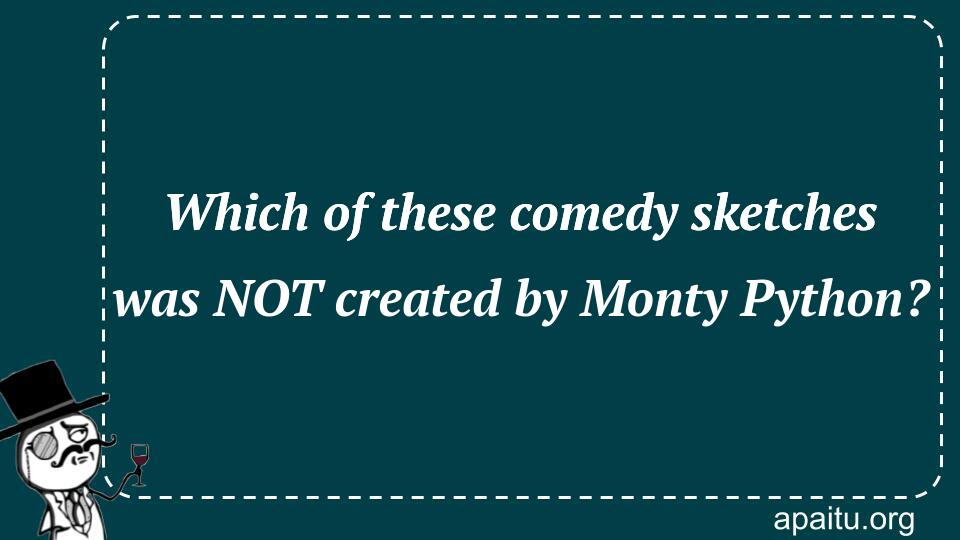Question
Here is the question : WHICH OF THESE COMEDY SKETCHES WAS NOT CREATED BY MONTY PYTHON?
Option
Here is the option for the question :
- Argument Clinic
- The Lumberjack Song
- Dead Parrot
- More Cowbell
The Answer:
And, the answer for the the question is :
Explanation:
The ground-breaking sketch comedy troupe Monty Python was founded by British comedians John Cleese, Eric Idle, Michael Palin, Graham Chapman, Terry Jones, and Terry Gilliam. Their ‘Flying Circus’ television series, which featured absurdist comedic sketches, ran from 1969 to 1974. In “Dead Parrot,” one of the more well-known sketches, a dissatisfied customer tries to return a dead parrot to the pet shop. However, ‘Saturday Night Live’ featured a segment called ‘More Cowbell’ in 2000.

When it comes to iconic comedy sketches, Monty Python is a name that immediately springs to mind. This legendary British comedy group, consisting of Graham Chapman, John Cleese, Terry Gilliam, Eric Idle, Terry Jones, and Michael Palin, revolutionized the world of comedy with their irreverent and absurdist humor. However, amidst their vast repertoire of sketches, there is one that stands out as an exception: “More Cowbell.” Join me as we explore the origins of Monty Python and their groundbreaking sketches, and discover why “More Cowbell” does not belong to their comedic legacy.
Monty Python’s Flying Circus, the influential sketch comedy television series that aired from 1969 to 1974, was the birthplace of some of the most memorable and enduring comedy sketches in history. The group’s unique blend of surrealism, wordplay, and social commentary captivated audiences and solidified their status as comedic pioneers.
The sketches created by Monty Python continue to be celebrated for their wit, creativity, and cultural impact. From classics like “The Ministry of Silly Walks” to “The Dead Parrot Sketch,” their work has transcended generations, finding new audiences and inspiring countless comedians and writers.
However, “More Cowbell” is not among Monty Python’s creations. This particular sketch is associated with another iconic comedy institution: Saturday Night Live (SNL). “More Cowbell” first aired on SNL on April 8, 2000, during a sketch titled “Behind the Music: Blue Öyster Cult.”
The sketch parodied the recording of Blue Öyster Cult’s hit song “(Don’t Fear) The Reaper” and featured the fictional band members, played by Christopher Walken, Will Ferrell, Chris Kattan, and other SNL cast members. In the sketch, Walken portrays the band’s producer, and Ferrell plays Gene Frenkle, a fictional cowbell player. The running gag revolves around Frenkle’s insistence on adding more cowbell to the song, to the exasperation of the other band members.
“More Cowbell” quickly became a cultural phenomenon, with Ferrell’s energetic performance and Walken’s deadpan delivery making the sketch a fan favorite. The catchphrase “I’ve got a fever, and the only prescription is more cowbell!” became instantly recognizable and entered the lexicon of popular culture.
While “More Cowbell” may not be a creation of Monty Python, it is a testament to the enduring impact and influence of their comedy. The sketch’s inclusion in this discussion highlights the wide-ranging influence of Monty Python on comedy, even beyond their own body of work.
Monty Python’s sketches, characterized by their absurdist premises, clever wordplay, and satirical commentary, continue to inspire and entertain audiences. Their unique brand of comedy challenged conventions and pushed the boundaries of what was considered acceptable humor, paving the way for future generations of comedians to explore new comedic frontiers.
while “More Cowbell” is a beloved and iconic comedy sketch, it does not belong to the comedic repertoire of Monty Python. Rather, it originated as a memorable sketch on Saturday Night Live, showcasing the comedic talents of Will Ferrell, Christopher Walken, and the SNL cast. Nevertheless, the inclusion of “More Cowbell” in discussions about Monty Python speaks volumes about the enduring influence of their comedy and the impact they have had on the world of humor.